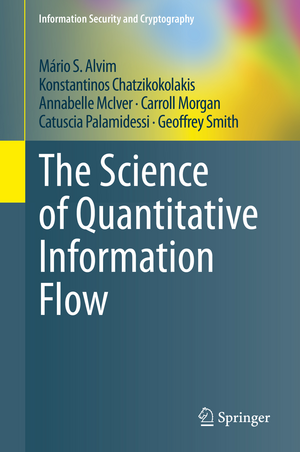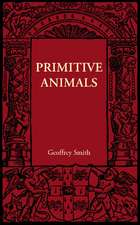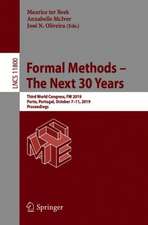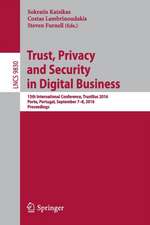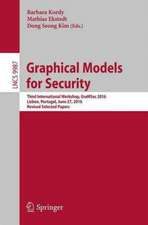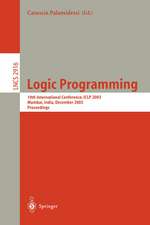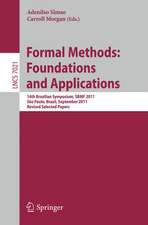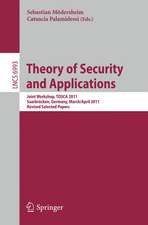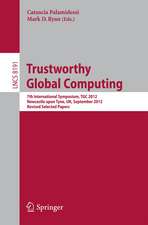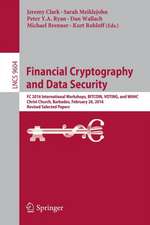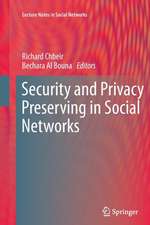The Science of Quantitative Information Flow: Information Security and Cryptography
Autor Mário S. Alvim, Konstantinos Chatzikokolakis, Annabelle McIver, Carroll Morgan, Catuscia Palamidessi, Geoffrey Smithen Limba Engleză Hardback – 23 sep 2020
Topics include: a systematic presentation of how unwanted information flow, i.e., "leaks", can be quantified in operationally significant ways and then bounded, both with respect to estimated benefit for an attacking adversary and by comparisons between alternative implementations; a detailed study of capacity, refinement, and Dalenius leakage, supporting robust leakage assessments; a unification of information-theoretic channels and information-leaking sequential programs within the same framework; and a collection of case studies, showing how the theory can be applied to interesting realistic scenarios.The text is unified, self-contained and comprehensive, accessible to students and researchers with some knowledge of discrete probability and undergraduate mathematics, and contains exercises to facilitate its use as a course textbook.
Din seria Information Security and Cryptography
- 20%
 Preț: 352.02 lei
Preț: 352.02 lei - 20%
 Preț: 770.30 lei
Preț: 770.30 lei - 20%
 Preț: 303.85 lei
Preț: 303.85 lei - 20%
 Preț: 1452.94 lei
Preț: 1452.94 lei - 20%
 Preț: 988.47 lei
Preț: 988.47 lei - 20%
 Preț: 327.10 lei
Preț: 327.10 lei - 20%
 Preț: 636.41 lei
Preț: 636.41 lei - 20%
 Preț: 453.21 lei
Preț: 453.21 lei - 20%
 Preț: 607.34 lei
Preț: 607.34 lei - 20%
 Preț: 331.40 lei
Preț: 331.40 lei - 20%
 Preț: 346.56 lei
Preț: 346.56 lei - 18%
 Preț: 950.52 lei
Preț: 950.52 lei - 24%
 Preț: 795.26 lei
Preț: 795.26 lei - 20%
 Preț: 595.07 lei
Preț: 595.07 lei - 20%
 Preț: 487.73 lei
Preț: 487.73 lei -
 Preț: 450.28 lei
Preț: 450.28 lei - 20%
 Preț: 877.77 lei
Preț: 877.77 lei - 20%
 Preț: 332.39 lei
Preț: 332.39 lei - 20%
 Preț: 418.59 lei
Preț: 418.59 lei - 20%
 Preț: 649.28 lei
Preț: 649.28 lei - 20%
 Preț: 552.72 lei
Preț: 552.72 lei - 20%
 Preț: 577.40 lei
Preț: 577.40 lei - 20%
 Preț: 653.38 lei
Preț: 653.38 lei - 20%
 Preț: 670.25 lei
Preț: 670.25 lei - 20%
 Preț: 334.53 lei
Preț: 334.53 lei - 20%
 Preț: 414.72 lei
Preț: 414.72 lei - 20%
 Preț: 640.69 lei
Preț: 640.69 lei
Preț: 406.32 lei
Preț vechi: 507.90 lei
-20% Nou
Puncte Express: 609
Preț estimativ în valută:
77.77€ • 80.88$ • 65.17£
77.77€ • 80.88$ • 65.17£
Carte tipărită la comandă
Livrare economică 13-27 martie
Preluare comenzi: 021 569.72.76
Specificații
ISBN-13: 9783319961293
ISBN-10: 3319961292
Pagini: 480
Ilustrații: XXVIII, 478 p.
Dimensiuni: 155 x 235 mm
Greutate: 0.89 kg
Ediția:1st ed. 2020
Editura: Springer International Publishing
Colecția Springer
Seria Information Security and Cryptography
Locul publicării:Cham, Switzerland
ISBN-10: 3319961292
Pagini: 480
Ilustrații: XXVIII, 478 p.
Dimensiuni: 155 x 235 mm
Greutate: 0.89 kg
Ediția:1st ed. 2020
Editura: Springer International Publishing
Colecția Springer
Seria Information Security and Cryptography
Locul publicării:Cham, Switzerland
Cuprins
Part I, Motivation.- Introduction.- Part II, Secrets and How to Measure Them.- Modeling Secrets.- On g-Vulnerability.- Part III, Channels and Information Leakage.- Channels.- Posterior Vulnerability and Leakage.- Robustness.- Capacity.- Composition of Channels.- Refinement.- The Dalenius Perspective.- Axiomatics.- The Geometry of Hypers, Gains, and Losses.- Part IV, Information Leakage in Sequential Programs.- Quantitative Information Flow in Sequential Computer Programs.- Hidden-Markov Modeling of QIF in Programs.- Program Algebra for QIF.- Iteration and Non-termination.- A Demonic Lattice of Information.- Part V, Applications.- The Crowds Protocol.- Timing Attacks on Blinded and Bucketed Cryptography.- Defense Against Side Channels.- Multi-party Computation: The Three Judges Protocol.- Voting Systems.- Differential Privacy.- Glossary and Index.
Notă biografică
Mário S. Alvim is assistant professor in the Computer Science Department of the Universidade Federal de Minas Gerais in Belo Horizonte. His current research interests include formal methods for security and privacy, as well as applications of quantitative information flow to fields beyond security. Kostas Chatzikokolakis is associate professor at the University of Athens. He works on security and privacy, in particular quantitative information flow, location privacy, and differential privacy. Annabelle McIver is professor in the Dept. of Computing at Macquarie University in Sydney. She works on mathematical techniques for the verification of probabilistic systems. Carroll Morgan is professor in the School of Engineering and Computer Science at the University of New South Wales, and is affiliated with the Trustworthy Systems Group of CSIRO’s Data61. His current interests are quantitative information flow, program derivation (including security), and proved correctness of multicore operating-system kernels. Catuscia Palamidessi is director of research at Inria Saclay. She is the leader of COMÈTE, a research team in the Inria and École Polytechnique shared lab. Her main research interests are quantitative information flow, privacy, and concurrency theory. Geoffrey Smith is professor in the School of Computing and Information Sciences of Florida International University in Miami. His current research interests include quantitative information flow and its applications to cryptography.
Textul de pe ultima copertă
<p>This book presents a comprehensive mathematical theory that explains precisely what information flow is, how it can be assessed quantitatively – so bringing precise meaning to the intuition that certain information leaks are small enough to be tolerated – and how systems can be constructed that achieve rigorous, quantitative information-flow guarantees in those terms. It addresses the fundamental challenge that functional and practical requirements frequently conflict with the goal of preserving confidentiality, making perfect security unattainable.</p><p>Topics include: a systematic presentation of how unwanted information flow, i.e., "leaks", can be quantified in operationally significant ways and then bounded, both with respect to estimated benefit for an attacking adversary and by comparisons between alternative implementations; a detailed study of capacity, refinement, and Dalenius leakage, supporting robust leakage assessments; a unification of information-theoretic channels and information-leaking sequential programs within the same framework; and a collection of case studies, showing how the theory can be applied to interesting realistic scenarios.</p><p>The text is unified, self-contained and comprehensive, accessible to students and researchers with some knowledge of discrete probability and undergraduate mathematics, and contains exercises to facilitate its use as a course textbook.</p>
Caracteristici
Computer systems that process sensitive information should preserve that information's confidentiality, but our current cyber-infrastructure is failing to achieve this goal: reports of massive-scale information disclosures are distressingly frequent Written by an international team of six experts, with diverse research backgrounds, whose work was recognized with the NSA's Best Scientific Cybersecurity Paper Award in 2015 and the ETAPS 2020 Test of Time Award Unified, self-contained, and comprehensive presentation, with numerous exercises, suitable for students and researchers
